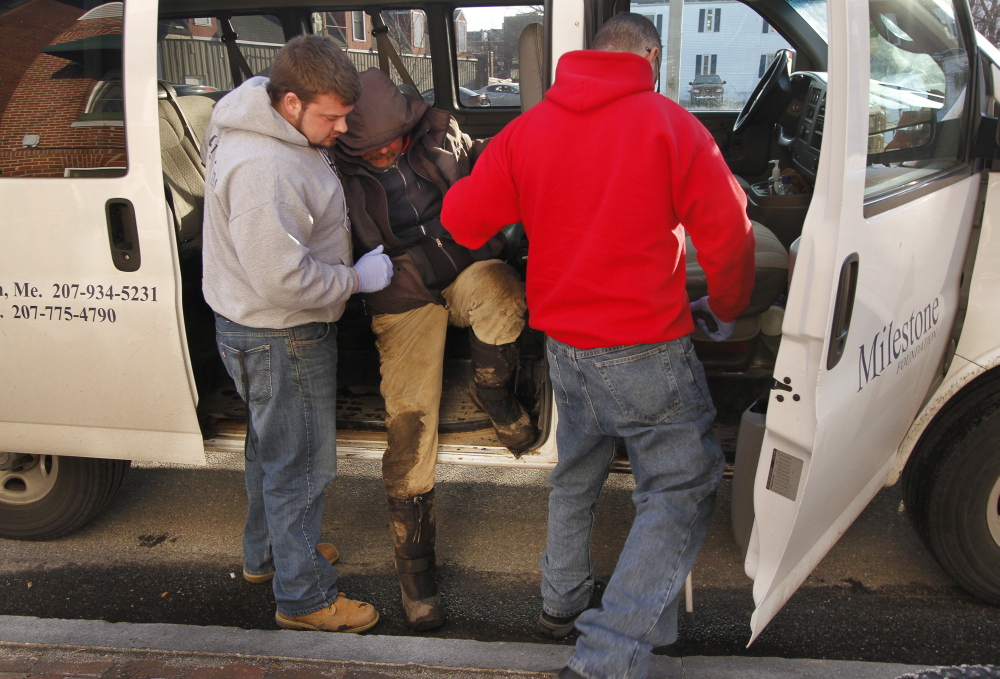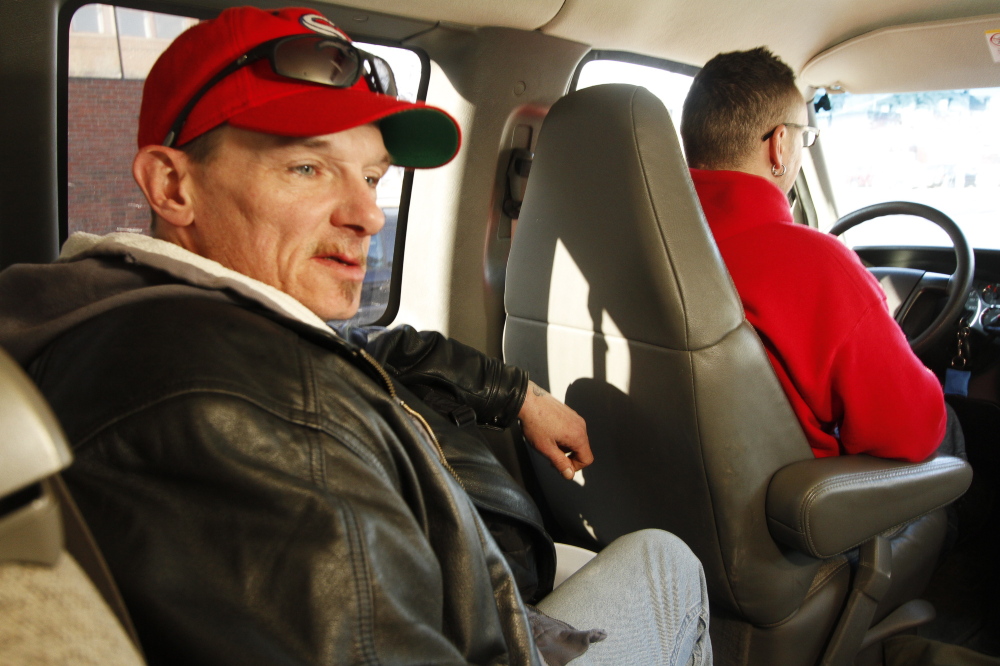By the time the white passenger van rolled into a tiny parking lot on Cedar Street late Thursday afternoon, Don Dietz was struggling to stay standing.
Beer cans littered a patch of dirt at his feet as he held on to a bush bare of leaves, next to a low concrete wall on the property line.
It’s one of the spots where people in Portland’s growing homeless population go to drink, hidden in plain sight as the city bustles on all sides.
Allen Patti and Joe McNally are no strangers to that patch of earth. In the beat-up van with a broken door handle and torn bench seats, they rove the city offering the drunk and drug-addicted – or anyone else in need – a simple service that means so much: the pleasure of a ride.
“Get ’em in, get ’em out of the hot or the cold, get ’em a sandwich and a few hours’ sleep,” said McNally, who has soft eyes and a way with people. “We’re not the law, so we can work on them a little easier. They know we’re trying to help them.”
But the HOME Team program, as the van service is known, is expected to come to a screeching halt on June 30, when its $75,000 in annual federal funding ends. The cut would leave the program with just $25,000 from the city, not enough to continue operating.
The program’s only hope is an infusion from outside, or a decision by the Portland City Council to restore the Community Development Block Grant funding.
City Manager Mark Rees said decisions are made first by a city committee that evaluates applications from more groups than the available money can fund, relying on a scoring system to determine which ones get funding.
The city manager then weighs in. For the year that starts July 1, Rees made recommendations that largely paralleled the committee’s work.
The recommendations then go to the City Council.
‘RESCUE VAN’ HAS WON HIGH PRAISE
Introduced in 2010, the Homeless Outreach and Mobile Engagement Team is coordinated by the Milestone Foundation, the city’s “wet” shelter for alcoholics and other addicts. Its outreach workers have intervened on behalf of the city’s most impoverished and vulnerable, taking them off the streets and into shelters, instead of jail or the hospital, where taxpayers pay a sometimes bigger tab.
The team targets some of the most frequent users of city services, aiming to ease the burden on emergency rooms and the police department, said Tom Natalie, acting director of the Milestone Foundation.
Natalie said he is disappointed with the funding decision but understands that there are many programs that deserve funding.
So far, he said, the city’s hospitals have been reluctant to step up financially, and he worries that his clients could end up in emergency rooms rather than his shelter.
“(The hospitals) may see the importance of it down the line,” Natalie said. “I hope it doesn’t come to that, that they realize the need isn’t going to go away.”
In the 12 months that ended Jan. 31, the HOME Team recorded 8,008 contacts with clients, transporting 2,700 people, mostly to the Milestone shelter on India Street. Running from noon to 8 p.m. six days a week, the service is the connective tissue in a fragmented system of support, said McNally, the HOME Team outreach worker.
The “rescue van” has won high praise from many corners, including the police and fire departments, whose respective chiefs urged city leaders last year to approve its grant funding for the next year.
“The (HOME) Team has worked tirelessly to identify high users of public services, working toward building rapport and trust with them,” Police Chief Michael Sauschuck wrote in a letter of support dated Nov. 5. “This in turn has dramatically decreased many of the behaviors that cause problems for public safety departments and preserved availability of more costly services.”
That means police and EMTs have more time to spend on more serious calls, often leaving the scene of an encounter once they know the HOME Team is on its way, said McNally and Natalie.
Business owners, weary of disorderly or intoxicated people loitering near their businesses, have someone to call.
“I’ve seen the positive influence, and we’re really working toward maintaining the good momentum we have downtown,” said Steve Hewins, executive director of Portland’s Downtown District, a nonprofit that advocates for the city’s downtown.
“I don’t think this is the time to go back on something that’s working,” he said.
One merchant who has seen the difference is Nancy Lawrence, who owns Portmanteau, a textile store on Wharf Street.
She said the loss of the van service would be devastating. As the “invisible help,” Lawrence said, the HOME Team stops situations before they escalate.
Lawrence said the cost of the program is a bargain when she considers the difference the HOME Team has made.
“They’re not highly visible,” Lawrence said. “I think maybe people don’t realize the ‘before’ and the ‘after.’ ”
SOME OF THE CLIENTS ARE REGULARS
As they have many times before and likely will do again, Patti and McNally climb out of the van at the tiny parking lot on Cedar Street. Each one takes hold of one of Dietz’s arms, easing him toward the van with the promise of a meal and a cigarette
Both outreach workers don blue nitrile gloves, and for a few laborious moments, nudge Dietz’s wobbly frame into the vehicle. He wears three sweatshirts, each a different color, under a thick down coat, hood pulled over his red forehead. His tan corduroy pants are caked in dirt.
Dietz is on a short, unwritten list of people whom Patti and McNally try to find every night and take to shelters. If they can’t find them, some of the clients, like Dietz, might not make it to the morning.
“Sometimes the people we help are late-stage alcoholics, and with that comes some health problems,” McNally said.
On their way to Milestone, with Dietz comfortable, McNally becomes a social worker, asking Dietz about the status of his housing voucher as if their conversation from the last time McNally picked him up had never stopped.
McNally thinks Dietz should seek a program in Alfred. Dietz asks if he can stay the night at the Milestone shelter. Like teenager and parent, they spar gently.
“You going to stay the whole night?” McNally asks.
“I always do,” Dietz says, his speech low and slurred.
McNally, in the front seat, stops filling out paperwork and looks over his shoulder, shooting Dietz a look of pure skepticism.
“Don’t you lie to me,” McNally said, half smiling. “When have I ever stood against you?”
Dietz capitulates. “Never.”
The van turns onto Middle Street a block from the Milestone shelter, sliding past trendy, expensive restaurants, young smiling couples and a businessman parking his BMW.
McNally and Patti park the van, and help Dietz out at the shelter.
In a few minutes, as they have done countless times, and likely will do countless times again until someone tells them they have to stop, McNally and Patti ease back into traffic, looking for the next person who needs a ride.
Matt Byrne can be contacted at 791-6303 or at:
mbyrne@pressherald.com
Twitter: MattByrnePPH
Send questions/comments to the editors.





Success. Please wait for the page to reload. If the page does not reload within 5 seconds, please refresh the page.
Enter your email and password to access comments.
Hi, to comment on stories you must . This profile is in addition to your subscription and website login.
Already have a commenting profile? .
Invalid username/password.
Please check your email to confirm and complete your registration.
Only subscribers are eligible to post comments. Please subscribe or login first for digital access. Here’s why.
Use the form below to reset your password. When you've submitted your account email, we will send an email with a reset code.